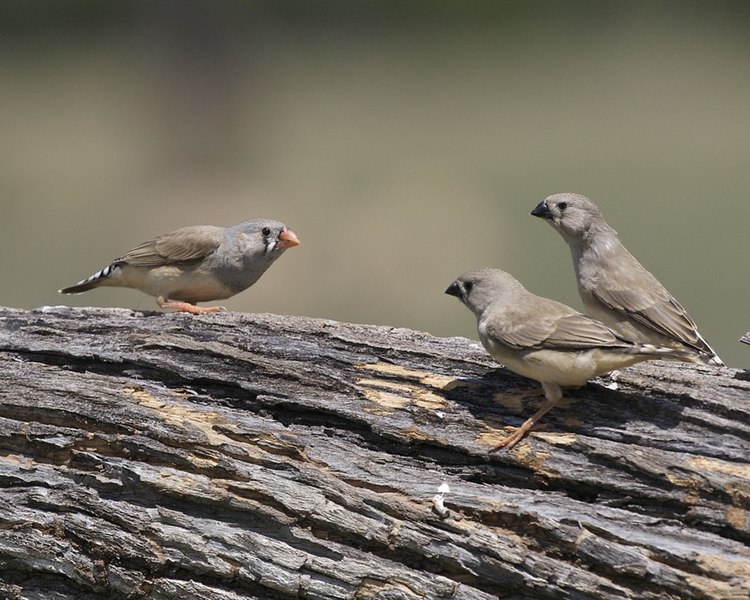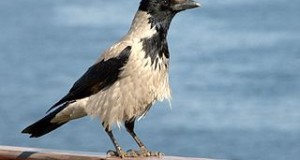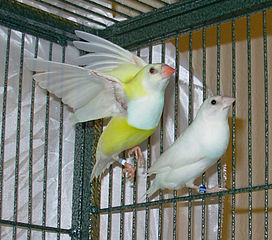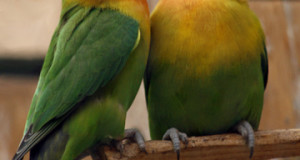 The ever-popular Zebra Finch, Taeniopygia guttata has been kept in captivity for almost 150 years, and is considered by most to be an “easy breeder”. However, the ease of breeding these little beauties should not be taken as an excuse to ignore their basic needs. While they will nest even under poor conditions, only when given proper care will breeding pairs remain in top condition and reward you with healthy, robust chicks.
The ever-popular Zebra Finch, Taeniopygia guttata has been kept in captivity for almost 150 years, and is considered by most to be an “easy breeder”. However, the ease of breeding these little beauties should not be taken as an excuse to ignore their basic needs. While they will nest even under poor conditions, only when given proper care will breeding pairs remain in top condition and reward you with healthy, robust chicks.
Enthusiastic Breeders
Zebra Finches provide an excellent introduction to captive bird breeding. They are native to Australia’s hot, dry grasslands and have evolved the ability to reproduce whenever ideal conditions (i.e. rain and mild temperatures) present themselves.
Unlike most birds, Zebra Finches that that are always supplied with ample food and nesting sites may breed year-round, producing 6 or more clutches (this is a drain on the hen, however- please see below). What’s more, they are wonderful parents and their courtship rituals and care of the young are a joy to observe.
Determining the Sex
The sex of normally-colored Zebra Finches is easy to determine. Adult males sport black bars on the breast and bright orange cheek-patches, both of which are absent in females (please see photo of female with chicks).
Youngsters under 5-6 weeks of age are impossible to sex visually (please see photo of chicks). Many color phases have been produced by breeders, and among these, differences between the sexes may be difficult to discern; behavior is your best guide here. Courting males sing and “bounce” before females, and may offer nesting material as well.
Zebra Finches may become sexually mature when only 3 months old, but it is best to wait until they are 9-12 months of age before allowing them to breed.
Diet
While Zebra Finches may reproduce and rear young when provided with a seed-only diet, breeders are best given fresh sprouts, small live or canned insects and egg food in addition to a high-quality basic seed mix.
Cuttlebone should always be available, especially when eggs are being produced, as the female’s calcium needs will soar.
The Cage and Breeding Supplies
People tend to keep finches in small cages, but they really should be given as much room as possible. This is especially true for a breeding pair. Bear in mind that once the hatchlings leave the nest, they will be fed by their parents for an additional 2-4 weeks. Therefore, your cage must be large enough for up to 8 birds. An aviary style or “flight cage” is ideal. You can breed Zebra Finches communally in an outdoor aviary, but do not keep more than a single nesting pair in an indoor cage.
The cage should be located in a quiet location, and stocked with ample supplies of commercial nesting material or dried grass (do not use string). A covered wicker nest box will be readily accepted, although some pairs prefer to construct their own domed nest.
Courtship and Nesting
 The male may follow the female about with bits of grass, apparently to “show off’ his nesting prowess. He usually does most of the actual nest-building, and the female incubates the eggs.
The male may follow the female about with bits of grass, apparently to “show off’ his nesting prowess. He usually does most of the actual nest-building, and the female incubates the eggs.
The eggs hatch in approximately 14 days…remove them if they have not hatched by day 21, as they are either infertile or something has gone awry during development. The chicks fledge at age 20-22 days, and are fed by their parents for an additional 2-3 weeks. They acquire their adult plumage and orange beaks by week 5-6, at which time they should be removed to a cage of their own.
Caution…“Over-Production”
Well-fed Zebra Finches will usually re-nest several times, but it is best to limit them to 2-4 clutches per year. More than that may tax the female’s strength and shorten her lifespan (and what will you do with 25-35 more finches!).
The presence of a nest site and nest material seems to stimulate them to breed, so remove these when you wish to give your breeders some “time-off”.
Further Reading
Zebra Finch Facts and History in the Pet Trade
Video: Tame Zebra Finches nesting in tree
Observations on wild Zebra Finches and other Australian birds
Zebra finch pair image referenced from wikipedia and originally posted by Keith Gerstung and uploaded by Snowmanradio
Zebra finch female with chicks image referenced from wikipedia and originally posted by Lip Kee Yap and uploaded by Snowmanradio
 That Bird Blog – Bird Care and History for Pet Birds
That Bird Blog – Bird Care and History for Pet Birds




Will the male Zebra Finch choose more than one mate? I have an avairy with two males and three females and am curious if one female will be left out and I need to get her a mate.
Hello Marsha, Frank Indiviglio here.
Thanks for your interest in our blog. Male zebra finches will mate with multiple females and if there are not too many extra females the young will usually get enough food. The main problem I’ve seen in colony situations (3 dozen or so adults) is that pairs often interfere with one another; actual fighting is not usually serious, but lots of nest material theft, broken eggs, disturbed incubation. Best to supply a few extra nest bowls/houses, and plenty of excess nesting material, and keep an eye on them. Five should work out, assuming they have enough space.
Please let me know if you need any further information. Good luck, enjoy and please let me know how it goes; would like to have your observations\, as every situation is unique.
Best regards, Frank Indiviglio.
Thnk you for your response. My aviary is 5′ x 3′ x 18″ and I love to watch them fly from end to end. One pair has 5 eggs in their nest and the other nesting bowls are empty and only used at this point for sleep. I have been reading\studying everything I can get my hands on as it has been many years since I had Finches. I really love your website.
Hello Marsha, Frank Indiviglio here.
Thanks for the kind words, much appreciated. Perhaps you might enjoy this article on zebra finch natural history.
Please let me know if you need any further information. Good luck, enjoy and please keep me posted.
Best regards, Frank Indiviglio.
Hi Frank, wanted to update you on my first babies. My pair had three eggs hatch, and all are male. One is a white male, with just a hint of grey, almost smokey tint to the tips of his wings. They are very happy, healthy little talkers. I am now looking for a home for the two grey males. I plan on keeping the white male.
It has been great to read you page. I have learned many valuable tips.
Talk to you soon!
Marsha
Hello Marsha, Frank Indiviglio here.
Thanks for the kind words and update. Nice to hear that all went so well. I hope you find them a good home; please keep me posted.
Here’s an article on Zebra Finch Natural History that you might enjoy; several others are posted on their value as research subjects. Amazing little birds!
Please let me know if you need any further information. Good luck, enjoy and please keep me posted.
Best regards, Frank Indiviglio.
Hi I have three babies 3 months old two males one female. My mother has a pair that just had three babies only out of next 9 days the father was pecking a lot at the babies most of the neck and shoulders are bald. I took the father out… My question should I put the father in with my 3 mo old babies… he seems very lonely ?
Hi Lorri,
Best to isolate until you have removed youngsters; this happens sometimes in captivity…hormones are not in sync, small cages etc change natural behaviors. I hope all goes well, Frank
My finches have payed 3 eggs, one every 12 hours , The mail was and then that’s constantly but now a male and female are in the nest does that mean that they are being fertilized and how many days or weeks does it take to get have the babies hatch. Thank you and waiting to hear from you. Donna
Hello,
No way to judge fertility now, best to leave them be, disturb as little as possible. Normal incubation period is 14 days, but leave until 21 days…if not hatched by then, the [pair will usually abandon, or you can remove and discard..enjoy, Frank
Thank you for your information I now have four eggs in their mailing female both of been laying on them and it was the walking like last night will not go in there try to get in there and all they did was lie each other on the cage Jason each other is that normal
Thanks, Donna -I hope all goes well, please keep me posted, Frank
I have a bonded pair of finches that currently are incubating 5 eggs. My mother had two male finches and one just had an untimely death from her cat. She has asked if I would take her remaining male so he isn’t lonely. Is this wise?
Hi Heather,
No, you wouldn’t be able to introduce to a mated pair; same sexes usually get along, or multiple pairs in large aviaries, but not as you describe. Keeping in a separate cage in same room could also be stressful, at least while the pair is raising chicks, best, Frank
I have quite a bunch of zebra finches. They all seem to be pairing up and laying eggs in all the food dishes whether or not I have given them nests. When I take out the nests to stop my female from constantly laying she takes over the food dishes. What can I do about this??? Do I have to separate all the birds into males in one cage and females in the other?? If I do this what happens to the ones that have paired up? Thank you.
Hi Shirley,
Well…it means they are content and well-cared for, but unfortunately they can be difficult to discouraged; females that lay multiple clutches decline in condition over time. Try switching from cup feeders to tubes, so that nest sites are removed. Pulling eggs usually encourages them to lay a replacement clutch; better to replace the eggs with dummy eggs sold for this purpose…pairs tend to desert dummy nests after the incubation period has passed. They may or may not re-nest, but worth trying. You can also shorten the day period if possible, and remove egg food or similar protein-based items from the diet. Splitting the sexes does often help, as male presence is a stimulating factor, but some females lay infertile eggs none-the-less. Be sure to provide plenty of cuttlebone or another Calcium source, Please keep me posted, Frank
Thank you for your quick response… One more question…..My birds seem to be missing quite a few feathers on the backs of their heads. Usually I put them in a separate cage until they grow in again. Does this mean I have too many birds in one cage??? I do notice a lot of the fluffy feathers all over the floor under the cages. The one cage has three paired up birds with one extra female. The cage is fairly large but maybe I am overcrowding?? Thanks.
Hi Shirley,
My pleasure.
Feather picking, fighting is very common in colony situations. It can be due to crowding, but even in very large aviaries the group dynamics play a role…unpaired birds generally suffer, or they may disrupt nesting of other birds. Providing more cover, perches, feeding and nesting sites can help, but removal as you do is often the best option,. watch birds when re-introduced, as they may be stressed, not feed well, etc…if this taxes the immune system, they may become ill and perhaps render other birds sick as well 9a type of revenge, I suppose!). Please keep me posted, Frank
Question: One of my zebra finches poop has changed. it is a mucus glob about the size of a maggot. I noticed her trying to pull it off. Is she sick?? I have always noticed their poop to be rather runny. Thanks. Looking forward to hearing from you. You are a great help….
Hi Shirley,
Thanks for the kind words…watery stool or mucus can indicate a wide range of problems…certain parasites, etc. which can be carried without other symptoms until populations rise or birds are otherwise stressed. Your vet should be able to run fecal tests and provide treatment..let me know if you need more info, best, Frank
Hi Frank
thanks for your input yesterday. when I got home from work my poor girl was huddled in the bottom of the cage in the corner. looked like she was barely alive sides just heaving…she didn’t even care that I was picking her up and touching her. I moved her immediately to a separate cage expecting her to die on me…I covered the cage for the night so she wouldn’t be disturbed by the other animals in the house. this morning she was back to her perky self singing and jumping all over the cage and eating up a storm. She must have been mega stressed in the other cage with the other female who is feeding a couple of babies always at her when she was anywhere sitting by the nest area.
Hi Shirley,
My pleasure. Stress can cause all sorts of reactions, and death, but watch that the bird is not eggbound; if he begins sitting on floor, heavy breathing etc again, vet intervention is needed or the resulting peritonitis will be fatal.
Also, I would look into fecal tests, re the droppings you mentioned.
Please keep me posted, frank
Good Morning Frank
Just to let you know my baby girl finch is totally back to normal. She really must have been stressed in the other cage. She is not egg bound, I did check for that. I grew up with over a hundred budgies since my parents were breeders so I did learn quite a bit. I never had finches before though. If I had know they were little breeders I would have got a same pair instead of male/female. lol Live and learn. I plan to put them in a outside aviary this summer since they love it outside. We live in the country. Thanks for you help with information. Nice to be able to talk with someone who has knowledge regarding these little creatures. I have found that pet stores sell these birds but do not know male from female. How do you tell male from female in the society finches?? The local pet store has a brown and white one and two that are very dark all over and they do not know which is which. Again, thanks.
Hi Shirley,
Good to hear…your keet experience will serve you well with finches I’m sure.
Society finches are difficult to sex, especially given their odd genetic history (they are a hybrid species…please see here for the story); behavior is the best guide – preening, feeding, display, “singing” – but same sex pairs will form also. They breed as freely as do zebras…in zoos we use both as foster parents and also as a source of eggs for egg-eating snakes. Enjoy, frank
I got a pair of finches at about 4 weeks old. I was told they should not mate until summer, 6 months old. I have not put any nesting material in the cage. Now at about 8 weeks the female has laid an egg. Do I need to separate the male and the female?
Hello Jayne,
They often do start quite early; removing the male will not likely stop her. You can replace the eggs with dummy eggs – should be available online; she’ll incubate and then abandon. Simply removing eggs will cause her to lay a replacement clutch. be sure she has plenty of calcium (cuttlebone,, hard boiled egg, commercial egg food) and watch that she does not become egg bound (straining, lethargic) as this sometimes occurs in young breeders, best, frank
Hi Frank…I just purchased an eight week old Parrotlet. I have been keeping a close eye on him to make sure he is eating good. I am worried since he only seems to be eating his millet and the other food in his cage is just sitting. Do I have to take away the millet to get him interested in his other food?? He has been hand tamed so we take him out of the cage every day and play with him. One side of his wings has been clipped so he more or less hops and flutters around not getting air bound. I don’t want him to get sick from not eating right. Thanks… looking forward to your input as usual.
Hello Shirley,
Yes, important to get the bird on a balanced diet…make changes slowly, gradually cutting back on millet, rather than removing all at once. Please let me know if you need more info, best Frank
thanks Frank. I will let you know how things go. I find your face book fascinating…I just love animals and birds…
Much appreciated, Shirley,
Let me know if you need anything, Frank
I will soon have my first clutch of zebra finch. Can I allow a male and female of the same clutch to mate?
Hello Donna,
It’s best avoided..a first time cross between siblings is generally not a problem, but many lines are already inbred – if you do not have information on prior generations,then the birds’ ancestors could already have been bred with close relatives. best regards, frank
For business purpose what type of breeding system of Zebra Finch is more active and productive between cage breeding and colony breeding?
Hi,
Colony breeding would be most effective – you’ll lose some eggs / nests due to interference from non-parents, but in general if given plenty of space and ample nest sites they produce well in colonies. best, frank
Hi, Frank Indiviglio,
I appreciate you effort the answer every single question. Thanks a lot……………
My pleasure, enjoy!
It’s so enjoyable to read your columns and reader response plus you are so congenial! Thanks!
I have three male society finches and have recently learned how to sex them aside from males singing-the males eye lines up with the beak opening while females eye is offset above the beak opening.
It’s been foolproof so far!
Hello Lisa Ann,
Thanks for the kind words, much appreciated!
That is a very promising observation, thanks; we have some similar rules for other species and reptiles/amphibs, although none involving eye placement.
Please keep e posted if you check further, and I’ll pass your tip along as well.
Best regards, Frank
I have two finches. One I know for certain is a male and the other I am 98% confident that it’s a female. They have a spacious habitat and a hanging hut as a potential nesting area. I am wanting to introduce a second female into the habitat, but I don’t know if it would hinder the friendship among the two finches. Would it be ideal for two females rather than just one?
Three birds of a species can be a bad thing, as the third bird will end up odd-man-out and could be picked on by the other two. A particularly bad situation is having two males and one female, as there will be great competition between the males for the affection of the female. Likewise, two pairs can sometimes be a bad thing, as competition can arise between the pairs. A single pair or three pairs or more should generally work out better.